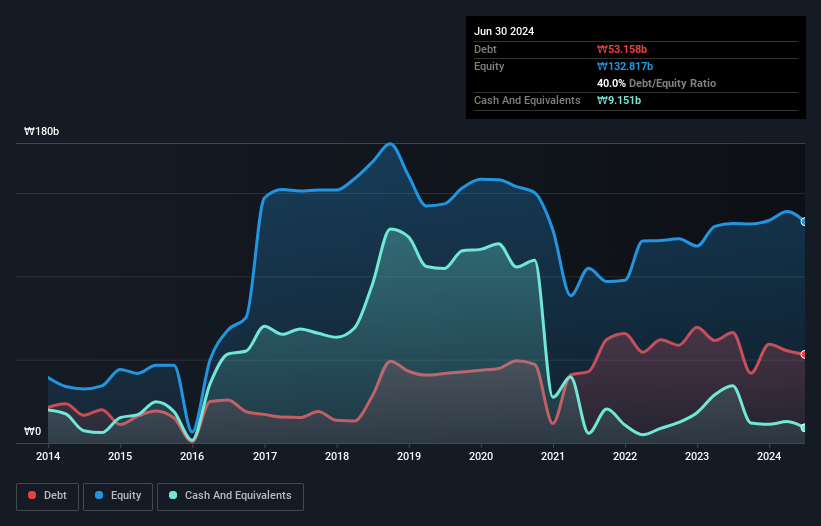Legendary fund manager Li Lu (who Charlie Munger backed) once said, 'The biggest investment risk is not the volatility of prices, but whether you will suffer a permanent loss of capital.' So it seems the smart money knows that debt - which is usually involved in bankruptcies - is a very important factor, when you assess how risky a company is. We note that Hansung Cleantech Co., Ltd. (KOSDAQ:066980) does have debt on its balance sheet. But the real question is whether this debt is making the company risky.
What Risk Does Debt Bring?
Generally speaking, debt only becomes a real problem when a company can't easily pay it off, either by raising capital or with its own cash flow. In the worst case scenario, a company can go bankrupt if it cannot pay its creditors. However, a more common (but still painful) scenario is that it has to raise new equity capital at a low price, thus permanently diluting shareholders. Of course, plenty of companies use debt to fund growth, without any negative consequences. The first thing to do when considering how much debt a business uses is to look at its cash and debt together.
Check out our latest analysis for Hansung Cleantech
How Much Debt Does Hansung Cleantech Carry?
The image below, which you can click on for greater detail, shows that Hansung Cleantech had debt of ₩53.2b at the end of June 2024, a reduction from ₩66.3b over a year. However, because it has a cash reserve of ₩9.15b, its net debt is less, at about ₩44.0b.

A Look At Hansung Cleantech's Liabilities
The latest balance sheet data shows that Hansung Cleantech had liabilities of ₩93.6b due within a year, and liabilities of ₩25.4b falling due after that. On the other hand, it had cash of ₩9.15b and ₩24.5b worth of receivables due within a year. So its liabilities outweigh the sum of its cash and (near-term) receivables by ₩85.5b.
This is a mountain of leverage relative to its market capitalization of ₩101.6b. Should its lenders demand that it shore up the balance sheet, shareholders would likely face severe dilution. When analysing debt levels, the balance sheet is the obvious place to start. But it is Hansung Cleantech's earnings that will influence how the balance sheet holds up in the future. So if you're keen to discover more about its earnings, it might be worth checking out this graph of its long term earnings trend.
In the last year Hansung Cleantech had a loss before interest and tax, and actually shrunk its revenue by 23%, to ₩294b. That makes us nervous, to say the least.
Caveat Emptor
Not only did Hansung Cleantech's revenue slip over the last twelve months, but it also produced negative earnings before interest and tax (EBIT). Indeed, it lost ₩3.7b at the EBIT level. Considering that alongside the liabilities mentioned above does not give us much confidence that company should be using so much debt. Quite frankly we think the balance sheet is far from match-fit, although it could be improved with time. However, it doesn't help that it burned through ₩21b of cash over the last year. So in short it's a really risky stock. There's no doubt that we learn most about debt from the balance sheet. However, not all investment risk resides within the balance sheet - far from it. For example Hansung Cleantech has 4 warning signs (and 2 which are a bit unpleasant) we think you should know about.
Of course, if you're the type of investor who prefers buying stocks without the burden of debt, then don't hesitate to discover our exclusive list of net cash growth stocks, today.
Valuation is complex, but we're here to simplify it.
Discover if Hansung Cleantech might be undervalued or overvalued with our detailed analysis, featuring fair value estimates, potential risks, dividends, insider trades, and its financial condition.
Access Free AnalysisHave feedback on this article? Concerned about the content? Get in touch with us directly. Alternatively, email editorial-team (at) simplywallst.com.
This article by Simply Wall St is general in nature. We provide commentary based on historical data and analyst forecasts only using an unbiased methodology and our articles are not intended to be financial advice. It does not constitute a recommendation to buy or sell any stock, and does not take account of your objectives, or your financial situation. We aim to bring you long-term focused analysis driven by fundamental data. Note that our analysis may not factor in the latest price-sensitive company announcements or qualitative material. Simply Wall St has no position in any stocks mentioned.
About KOSDAQ:A066980
Good value with adequate balance sheet.
Market Insights
Community Narratives




